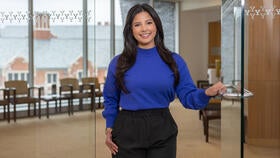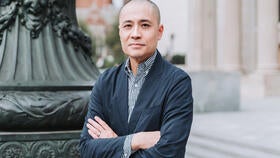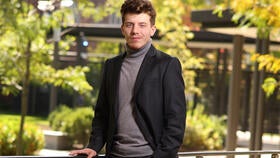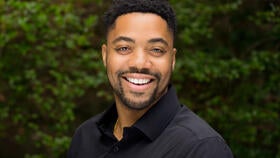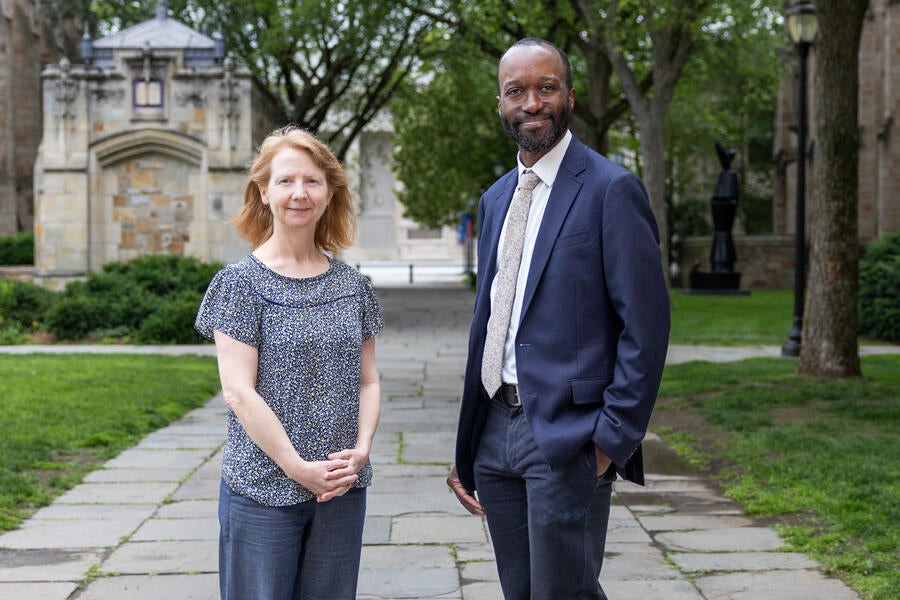
A shared passion inspired Julie Linden and Jamaal Thomas to attend the launch event of Disability Alliance at Yale (previously known as DiversAbility at Yale), an affinity group that strives to create an open and inclusive environment for all individuals impacted by disabilities — permanent, temporary, visible, or invisible. As co-chairs, they hope to evolve the group through support and advocacy.
Linden, the director of collection development in the Yale Library, manages the general collections budget. She grew up in Plainfield, Connecticut, and completed a Bachelor of Arts degree in English and political science and a Master of Arts degree in English, both at the University of Connecticut. She later attended Syracuse University earning a Master of Library Science. Linden started her career at Yale in 2000 as a data and electronic services librarian in the Social Science Library.
Thomas is the associate director of the Office of Institutional Equity and Accessibility (OIEA), a position he has held since joining Yale nine years ago. He grew up in Brooklyn, New York, and earned a Bachelor of Arts degree in political science from SUNY Purchase and a Juris Doctorate from St. John’s University. Before Yale, he was General Counsel for the Center for Alternative Sentencing and Employment Services (CASES).
In the following interview, Linden and Thomas discuss what drew them to DAY and what they hope to accomplish. The interview has been lightly edited and condensed.
One of your goals as co-chairs was to explore the name of this affinity group. When the affinity group was originally launched, it was called DiverseAbility at Yale. You recently launched a new name and a new logo. Can you talk about how that came about and your process?
Linden and Thomas: In response to our members and others in the Yale community, the DAY Steering Committee discussed changing its name to include the word “disability.” In spring 2023, Yale’s Office of Diversity and Inclusion engaged a third-party vendor, Accordant Advisors, who facilitated three focus groups and an anonymous survey to explore DAY’s name change. The intention was to be as inclusive as possible in gathering input for the renaming decision. We appreciated the deep and thoughtful engagement from focus group participants and were thrilled at the survey response rate.
The results of this research strongly supported changing DAY’s name to include “disability” and indicated a top choice. Considering this, DAY has changed its name to Disability Alliance at Yale. Former DAY co-chair Tracy MacMath, digital accessibility and design manager at the Beinecke Rare Book and Manuscript Library, volunteered to create our new logo, which beautifully captures the sentiment that it’s a “new DAY.” We celebrated the renaming with two “relaunch” parties in late September.
How did you get involved in Disability Alliance at Yale (DAY)?
Linden: I attended the group’s launch meeting in 2016 to learn more about DAY’s shape, aim, and goals. Over the years, I volunteered at events or took the lead on some programs. It was easy to stay engaged because I always learned something from the activities or from my fellow DAY members. The cool thing about DAY is that we don’t ask why people come or how disability has impacted their lives. Together, we have a common purpose.
Thomas: As part of my job here at Yale and throughout my career, I often encounter people from disabled communities and provide them support or guidance. I attended DAY’s launch and many early meetings, and I also volunteered to help with events. Recently, my role has been more of a resource or subject matter expert. Working with and supporting people from these communities are passions that evolved through my work as a lawyer for a small non-profit and in my current role. I quickly recognized how amazing it can be for people when you make small adjustments or remove barriers. Those experiences reminded me of the importance of doing all you can to support this community.
What kind of support does DAY offer, and who is it for?
Linden: Through engagement and education, DAY hopes to create an open and inclusive space for all individuals affected by disability. The group also advocates for the recruitment, retention, and advancement of staff and faculty with disabilities.
DAY meets on the first Thursday of every month from 12 p.m. to 1:00 p.m. via Zoom, with periodic hybrid meetings. Everyone is invited to join, share ideas, or get involved.
There are many aspects to disabilities and different kinds of disabilities. There are also many ways that a disability can have an impact on someone’s life. We seek out ways in which we can be helpful to our members. For example, we partnered with two other affinity groups, the Yale Veterans Network and the LGBTQ Affinity Group, to present a panel on Suicide Prevention Awareness. Other events have a broader scope. We invited Yale staff to share their personal experiences of disability in a “community stories” event, which did not focus on any one type of disability. Our social events allow people to get to know one another and build personal support networks.
Thomas: DAY offers awareness, education, and, most importantly, community building between and among people in the disabled community and the broader Yale community. We also provide advocacy around accessibility issues. I hope during my tenure that we can evolve those three areas. We’ve provided programming that focuses on the lived experiences of people with disabilities and their family members. The community piece includes social events and meetings that are welcoming and supportive where someone can speak to this part of their experience without concern.
What has been the most memorable part of your experience with DAY so far?
Linden: An event that we’ve done multiple times that always creates wonderful new memories is volunteering at G.R.O.W.E.R.S., Inc., a New Haven organization that provides horticultural education, employment opportunities, and therapy for adults with developmental and physical disabilities. For the last two years, DAY has partnered with Future Leaders of Yale (FLY) as part of the Yale Day of Service. It’s been rewarding to be welcomed and to work alongside the staff and clientele of G.R.O.W.E.R.S.
Thomas: Helping to organize and attend DAY’s Disability Community Stories event last fall was a reminder of one of the most powerful things that DAY can do – create a space for one of Yale’s incredibly diverse and talented communities. It brought together four storytellers who shared personal stories about their experiences with disability. Each person told powerful stories about disability, advocacy, challenges, and triumphs. Hearing their experiences filled my heart with joy and also moved me to tears.
How has your experience with DAY affected your career?
Linden: Through my many interactions with DAY volunteers and members, I’ve become a better advocate for proactive accessibility within the library and other organizations I’m involved with. This became particularly important in the past couple of years as meetings and events that were virtual during 2020 and 2021 shift to in-person or hybrid. I think a lot about what “accessibility” for meetings and events should look like today. I’ll continue to learn about these issues and improve my ability to be an accessibility advocate for the remainder of my career.
Thomas: It is meshed with my professional development here, and now as a co-chair, I’m curious to see how it evolves. As an associate director at OIEA, I have specific professional responsibilities related to facilitating reasonable accommodations for faculty with disabilities and investigating complaints of disability discrimination and/or harassment. My involvement with DAY is more of a personal passion. Part of what excites me about being co-chair is that I can proactively support this community. I’m thrilled to pursue something personally important to me outside of my day-to-day work environment that can deepen my understanding of the issues that are meaningful to the disabled communities at Yale.
What do you hope to accomplish, or what have you accomplished as a chair of the affinity group?
Linden: Over the past several months, I’ve participated in leading a reconsideration of the name “DiversAbility.” We received feedback that this group’s name should incorporate the word “disability.” My previous co-chair Daniel Cress and I began group discussions with DAY’s Steering Committee. We worked with the Office of Diversity and Inclusion to engage an external consultant who held focus groups and fielded a survey to gather feedback on the name. The conversations have been incredibly rich and informative. I hope that they have helped to build mutual respect and empathy among those who may have different opinions about the name.
Thomas: I want to create a space where people in the disabled community can show up at Yale in any way they choose and find a supportive and welcoming environment. I’d also like to honor and celebrate our members. Creating a space where people can be themselves is the key to retaining and advancing staff members who may have disabilities, as well as those who have family members with disabilities. I’ve learned through guidance from the deaf community that we can view individuals not through the lens of deficit but through the lens of difference. I want to do what I can to spread that sentiment.
Yale’s affinity groups are supported by the Office of Diversity and Inclusion, under the leadership of Deborah Stanley-McAulay, associate vice president of employee engagement and workplace culture. This is the fourth in a series of interviews with affinity group leaders, volunteers who are chosen by their peers for two-year terms. The first three installments featured the co-chairs of the Working Women’s Network, the Yale Veterans Network, and the LGBTQ Network.



